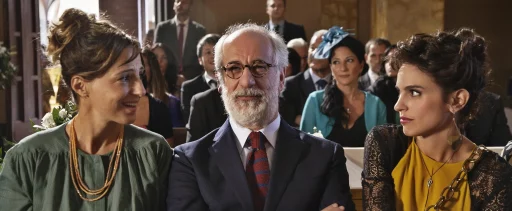South Korean action movies are box office powerhouses and some of the most stylish stories in modern cinema. Take Extreme Job (2019), for example, an action comedy, which remains the highest-grossing film in South Korean history, with over 10 million admissions and a massive box office haul relative to its budget. The Roundup (2022), a crime action film, became the highest-grossing Korean film since the pandemic, with over 12.6 million admissions and more than US$100 million at the global box office. Needless to say, the genre is well-developed locally and has given birth to its own sub-genres and stars.
In this list, we’re looking at Korean action movies beyond the Hollywood scale numbers you can watch now on UVOtv. These movies show elaborate heists, spy games, brotherhood and betrayal, bringing the classic plot twists into a uniquely Korean cultural setting.
The Long Way Home (2015)
Directed by: Cheon Seong-il
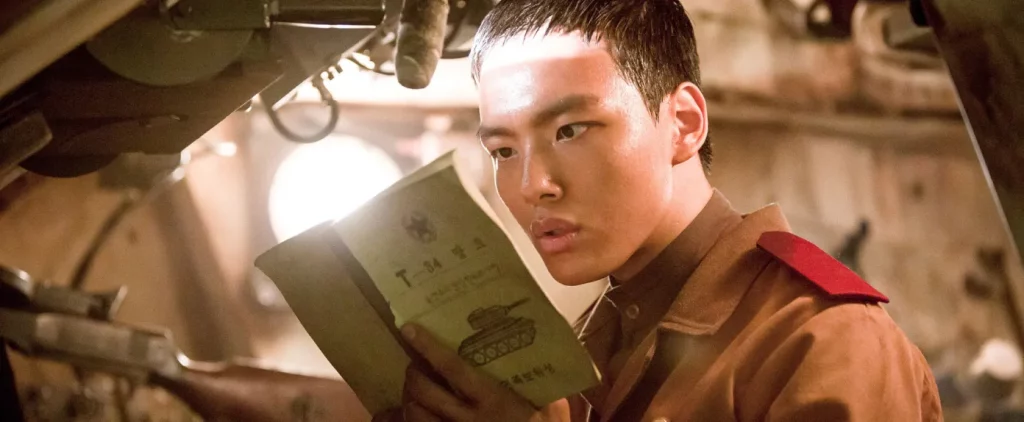
Set in 1953, during the closing days of the Korean War, the film follows a middle-aged farmer reluctantly drafted into the South Korean army. Tasked with delivering a crucial military document, he loses it in an ambush and ends up behind enemy lines. Meanwhile, a young North Korean soldier and the last survivor of his unit stumbles upon the document while fumbling with a captured tank. When the two enemies cross paths, their initial attempts to kill each other give way to an uneasy alliance.
Though built on the familiar trope of enemies-turned-allies, The Long Way Home uses its odd-couple pairing to explore the shared humanity beneath political divides. The tank, clunky and dangerous, serves as a symbol of the absurd machinery of war itself, trapping people inside. The mix of comedy, drama, and action underscores the absurdity of the conflict while allowing space for moments of warmth and poignancy.
The film marked the directorial debut of screenwriter Cheon Seong-il (The Pirates, My Girlfriend Is an Agent). The film earned praise for staging effective battle sequences and for humanizing the conflict through small, personal storytelling rather than sweeping military spectacle. You can’t help but ask: if two soldiers can find common ground, why has peace taken so long?
The Con Artists (2014)
Directed by: Kim Hong-sun

What if the slickest safecracker in Seoul found himself tangled in a $150 million heist run by a mob boss who doesn’t play fair? The Con Artists is a glossy Korean caper that mixes charm, double-crosses, and big money stakes, even if the payoff isn’t always as sharp as its setup.
Ji-hyuck, played by Kim Woo-bin, a brilliant safe-cracker, teams up with a comic counterfeiter and a hacker for odd jobs. But when a ruthless mob boss discovers Ji-hyuck has stolen diamonds from his jewelry shop, he forces the young thief into a much bigger job of breaking into a high-security Incheon customs facility to steal a fortune in black money.
Released in 2014, The Con Artists brought in 2.6 million admissions at the Korean box office. The film leans on the Hollywood heist-movie structure, but what stands out is how it frames deception and power.
Secret Reunion (2010)
Directed by: Jang Hoon
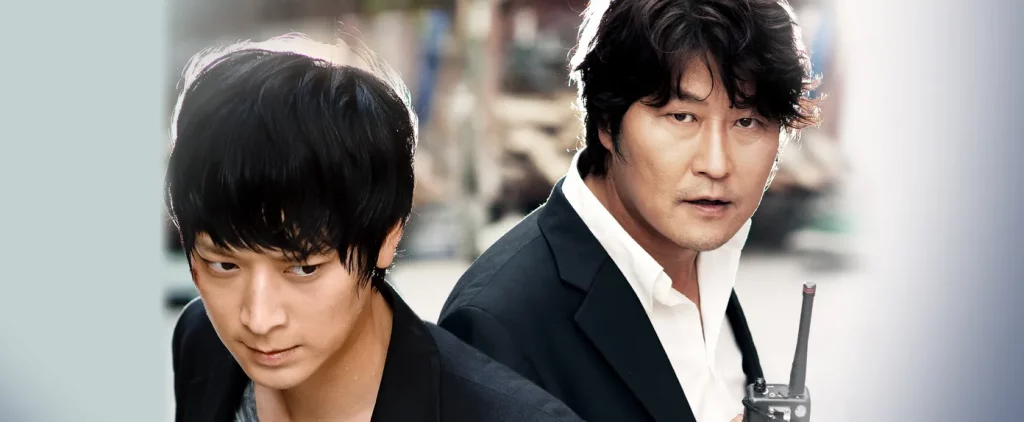
Lee Han-kyu was once a top agent for the National Intelligence Service, until a failed mission against a North Korean assassin known as “The Shadow” ended his career. Six years later, he’s running a modest detective agency that mostly deals with runaway mail-order brides. That’s when he crosses paths with Ji-won, a North Korean operative from the same botched mission. Each man sees the other as a chance to fix what went wrong—Han-kyu wants to get back into the NIS, while Ji-won hopes to clear his name and reunite with his family. Their uneasy arrangement slowly turns into something akin to friendship.
Despite lending traits from a spy thriller, Secret Reunion spends more time on the push-and-pull between two men who, on paper, should be enemies. The film shows how easily suspicion can give way to trust when people are thrown together. Han-kyu’s messy, rough-around-the-edges lifestyle clashes with Ji-won’s careful and considerate nature, making their relationship feel equal parts awkward and endearing.
The result is a film that balances tension with warmth. It works as a story about espionage, but it’s even more engaging as a story about connection across divides.
Pipeline (2021)
Directed by: Yu Ha
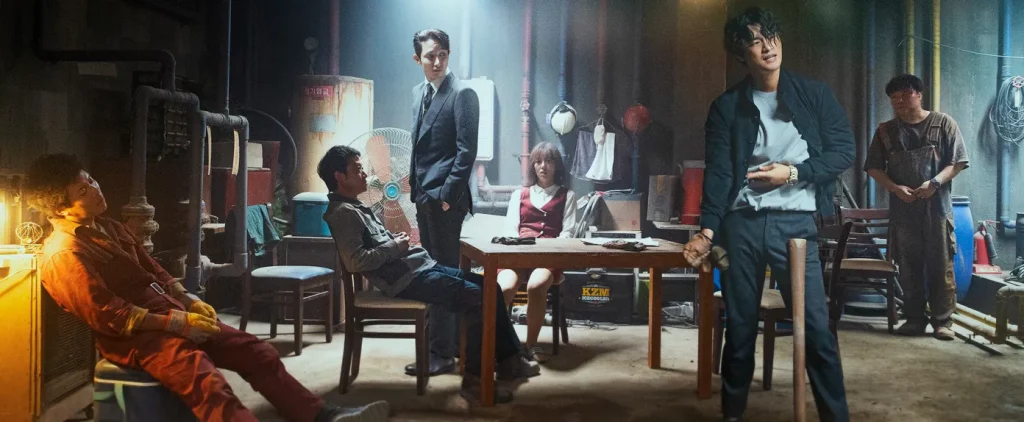
Pipeline takes the classic caper format and pumps it full of South Korean humor, tension, and corporate greed.
Drill-Bit, a talented but cocky drilling engineer, gets pulled in by oil executive Geon-woo to pull off a wild scheme: stealing crude straight out of one of Korea’s underground pipelines. He’s joined by a mismatched crew. Jeob-sae, who acts first and thinks later, section chief Na, who insists on doing things by the book, and Geun-sab, who panics at every turn. With Geon-woo losing patience fast, the team starts wondering if the payout is really worth risking their lives.
Unlike the usual vault-cracking or jewel-snatching heist, Pipeline spotlights oil, the lifeblood of South Korea’s industrial economy, as the target. The film explores the topics of anxiety about corporate corruption, resource exploitation, and the desperate scramble for wealth. Director Yu Ha uses the claustrophobic tunnels and drilling rigs to amplify the sense of being trapped. The humor comes from the misfit crew’s constant setbacks, but underneath lies a story about how much people will risk for short-term gain.
MISSION: POSSIBLE (2021)
Directed by: Kim Hyung-joo
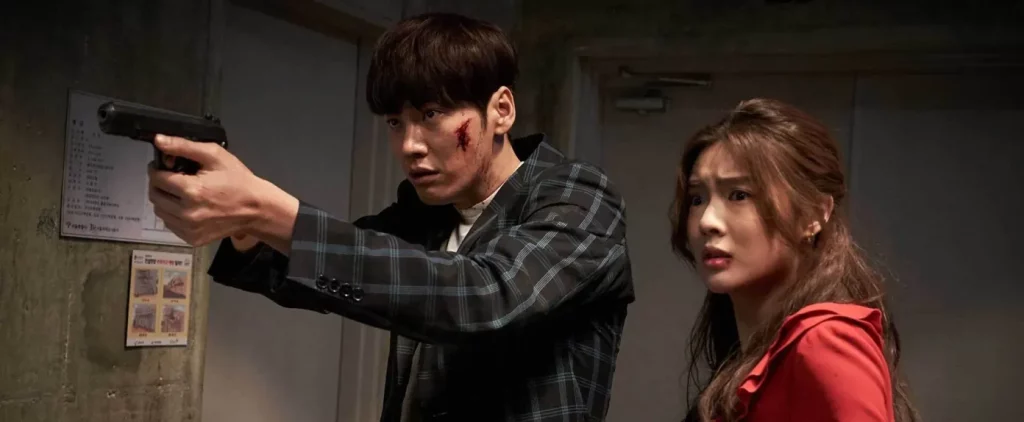
When a cache of Chinese firearms goes missing, rookie agent Yoo Da-hee is sent to Seoul under deep cover to trace the smugglers. She’s meant to link up with a Korean intelligence contact, but a twist of fate (and her own mistaken assumptions) leads her to Woo Soo-han (Kim Young-kwang), a down-on-his-luck private detective more interested in quick paydays than espionage. Together, the mismatched pair stumble through leads and a rising body count only to find themselves branded as suspects.
While the film doesn’t reach for layered social commentary, it thrives on parodying the spy genre. The very title winks at Mission: Impossible, but instead of polished agents pulling off impossible stunts, we get two characters fumbling their way through espionage tropes
At its heart, Mission: Possible isn’t asking you to take it seriously. It’s the kind of popcorn film that balances absurd comedy with surprisingly solid action.
Gangnam 1970 (2015)
Directed by: Yoo Ha
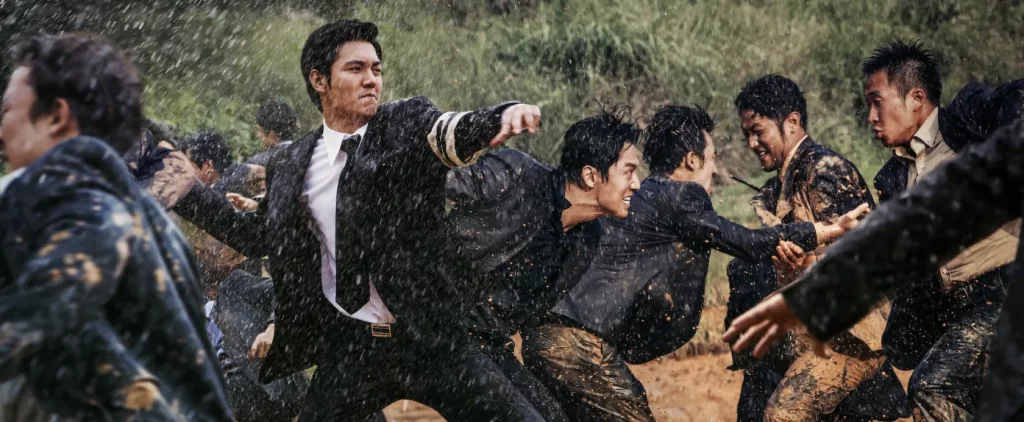
Gangnam 1970 is a crime saga where loyalty and ambition collide with greed, politics, and urban expansion.
As one can tell, it’s set in the 1970s. The film follows Jong-dae, played by the iconic Lee Min-ho, and Yong-ki, two orphans scraping by. When they get pulled into shady land deals tied to gangsters and politicians, their brotherly bond starts to crack. Each tries to carve out his own path, but the higher they climb, the more obvious it becomes that the shiny future of Gangnam is being built on betrayal and blood.
Beneath the brutal fight scenes and sweeping gangster drama, the film is really about the cost of progress. Yoo Ha uses the rapid development of Seoul’s Gangnam district as a metaphor for the corruption fueling modernization. Brotherhood is tested not just by external violence, but by the lure of wealth and status in a system where loyalty is disposable. The film’s cinematography adds period details, like the rain-soaked streets, the melancholic soundtrack, and the contrast between farmland and future skyscrapers.
Released in 2015, it was Lee Min-ho’s first big-screen lead after his vastly different roles in K-dramas, and it drew a lot of attention. Lee Min-ho won Best New Actor at the 52nd Grand Bell Awards, and also picked up Most Popular Actor at the Baeksang Arts Awards and the Blue Dragon Film Awards. Gangnam 1970 also took home the Producers’ Choice Award at the Bucheon International Fantastic Film Festival, and Yoo Ha’s team earned nominations for technical achievement.
Fight Fall Blues with Top Korean Action Movies on UVOtv
Few things hit harder than a well-made Korean action movie. And with UVOtv bringing top picks from Korean movies straight to you, the only question left is, what are you watching tonight?



